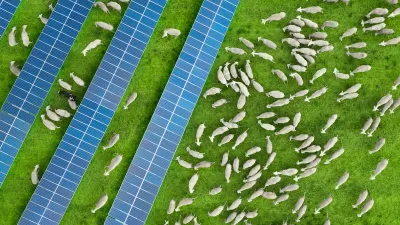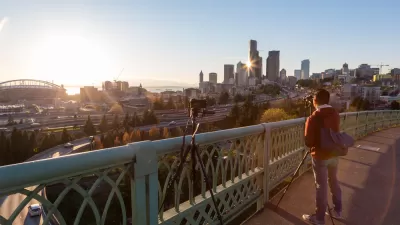The city of Milwaukee is repairing its streets and making them more bike and pedestrian friendly in the process.

Milwaukee is undertaking a large-scale repair and update of its streets according to Dave Schlabowske in Urban Milwaukee. "The repairs are designed to last seven to 10 years, and the city has been able to resurface more than 60 miles of streets," Schlabowske tell us. Most of these streets include bike lanes.
Like many cities in the Midwest, Milwaukee's population has been flat or shrinking for more than 50 years. So many of these streets don’t carry the previous volume of traffic and are in need of modernization. "When an arterial street is resurfaced as part of the rapid fix program, the city evaluates current traffic volumes and is able to make some geometric updates if needed using the new pavement marking patterns. In many cases these roadways were widened decades ago to serve our then growing traffic volumes during Milwaukee’s industrial heyday when thousands of factory workers began driving to work in large factories," Schlaboske reports. These modernizations include making lanes more narrow to reduce speed of cars and to protect pedestrians, as well as adding bike lanes and making other improvements.
Schlabowske, who is involved with the Bike Federation of Wisconsin, says, "We applaud that commitment, but look forward to the first new protected bike lanes, neighborhood greenways network (sometimes called bicycle boulevards, or safe streets) or other next generation bicycle improvements to encourage more people to ride in Milwaukee." I agree.
FULL STORY: City Streets Makeover Adds Bike Lanes

Coming Soon to Ohio: The Largest Agrivoltaic Farm in the US
The ambitious 6,000-acre project will combine an 800-watt solar farm with crop and livestock production.

Pennsylvania Mall Conversion Bill Passes House
If passed, the bill would promote the adaptive reuse of defunct commercial buildings.

U.S. Supreme Court: California's Impact Fees May Violate Takings Clause
A California property owner took El Dorado County to state court after paying a traffic impact fee he felt was exorbitant. He lost in trial court, appellate court, and the California Supreme Court denied review. Then the U.S. Supreme Court acted.

Dallas Surburb Bans New Airbnbs
Plano’s city council banned all new permits for short-term rentals as concerns about their impacts on housing costs grow.

Divvy Introduces E-Bike Charging Docks
New, circular docks let e-bikes charge at stations, eliminating the need for frequent battery swaps.

How Freeway Projects Impact Climate Resilience
In addition to displacement and public health impacts, highway expansions can also make communities less resilient to flooding and other climate-related disasters.
City of Costa Mesa
Licking County
Barrett Planning Group LLC
HUD's Office of Policy Development and Research
Mpact Transit + Community
HUD's Office of Policy Development and Research
Tufts University, Department of Urban and Environmental Policy & Planning
City of Universal City TX
ULI Northwest Arkansas
Urban Design for Planners 1: Software Tools
This six-course series explores essential urban design concepts using open source software and equips planners with the tools they need to participate fully in the urban design process.
Planning for Universal Design
Learn the tools for implementing Universal Design in planning regulations.


























